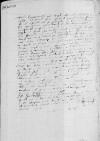 UUB, H. 154, f. 29r
UUB, H. 154, f. 29r
⌊Dominus Cracoviensis⌋ post longam absentiam nudius tertius rediit ⌊Cracoviam⌋. Heri apud eum pransus sum. Sentio illi non ingratum esse, quod „Proverbia” illi dicaverim. Mitto sex exemplaria „Proverbiorum” et sex commentariolos <in> in ⌊Paulum⌋. Quam primum ⌊Viennam⌋ aut ⌊Venetiam⌋ venero, augebo et iterum edam ms. aedam(!)
⌈edamedam ms. aedam(!)
⌉. Valde cuperem ⌊Philippum⌋ mihi respondere; sperarem me per ipsum Paulum rem posse tam facere claram, ut nemo dicturus non esset ita rem se habere nec posse aliter. Praelegi hic volente ⌊reverendissimo domino Cracoviensi⌋ epistolam ⌊divi Pauli⌋ in collegio satis, quantum percipere possum, cum gratia. Mittat quaeso Dominatio Vestra exemplar unum ⌊Gedanum⌋ ad dominum ⌊Iohannem a Werden⌋ et si videbitur, unum ⌊duci Prussiae⌋. ⌊Carolus Koctzer⌋ offert obsequia sua Reverendissimae Dominationi Vestrae, qui et litteras has a ⌊domino Lundensi⌋ tradidit mihi. ⌊Dominus Plocensis⌋ cupit „Ecclesiasten” dicare ⌊iuniori regi⌋, ego illi hoc magis promisi ms. permisi(!)
⌈promisipromisi ms. permisi(!)
⌉ Vestrae Dominationis causa{e}, quam quod ego illi quicquam debeam. Post haec festa proficiscar, Deo dante, ⌊Viennam⌋, ubi ⌊dominum Lundensem⌋, a ⌊Bavaris⌋ redeuntem, operier et fortasse ⌊Cornelium⌋ ipsum. Audivit, credo, Dominatio Vestra, quomodo Koski deluserit dominum Laski, qui eum sua pecunia liberavit a vinculis ea lege, ut arces quasdam munitissimas illi traderet, quod, factus liber, non fecit. Nonnihil me male habet, quod iam in tertium mensem a Dominatione Vestra absens nihil litterarum acceperim. Non habeo, quod scribam amplius, nisi quod ex animo Reverendissimae Dominationi Vestrae cum tota cognatione et familia prosperrima omnia opto. Est hic Polidamus et nudius tertius advenit ⌊Hercules⌋ quidam, qui ambo nihil habent, quo sese ostentent, quam quod de ⌊Erasmo⌋ male loquuntur nec sentiunt se rideri ab omnibus. Iterum valeat Reverendissima Dominatio Vestra.


 UUB, H. 154, f. 29v
UUB, H. 154, f. 29v